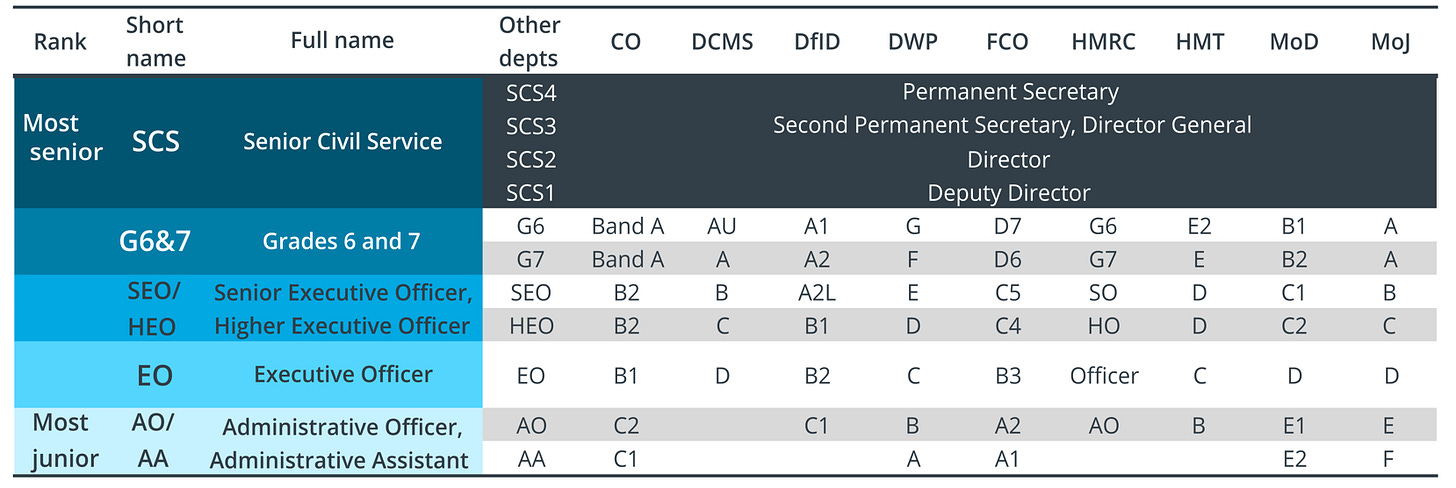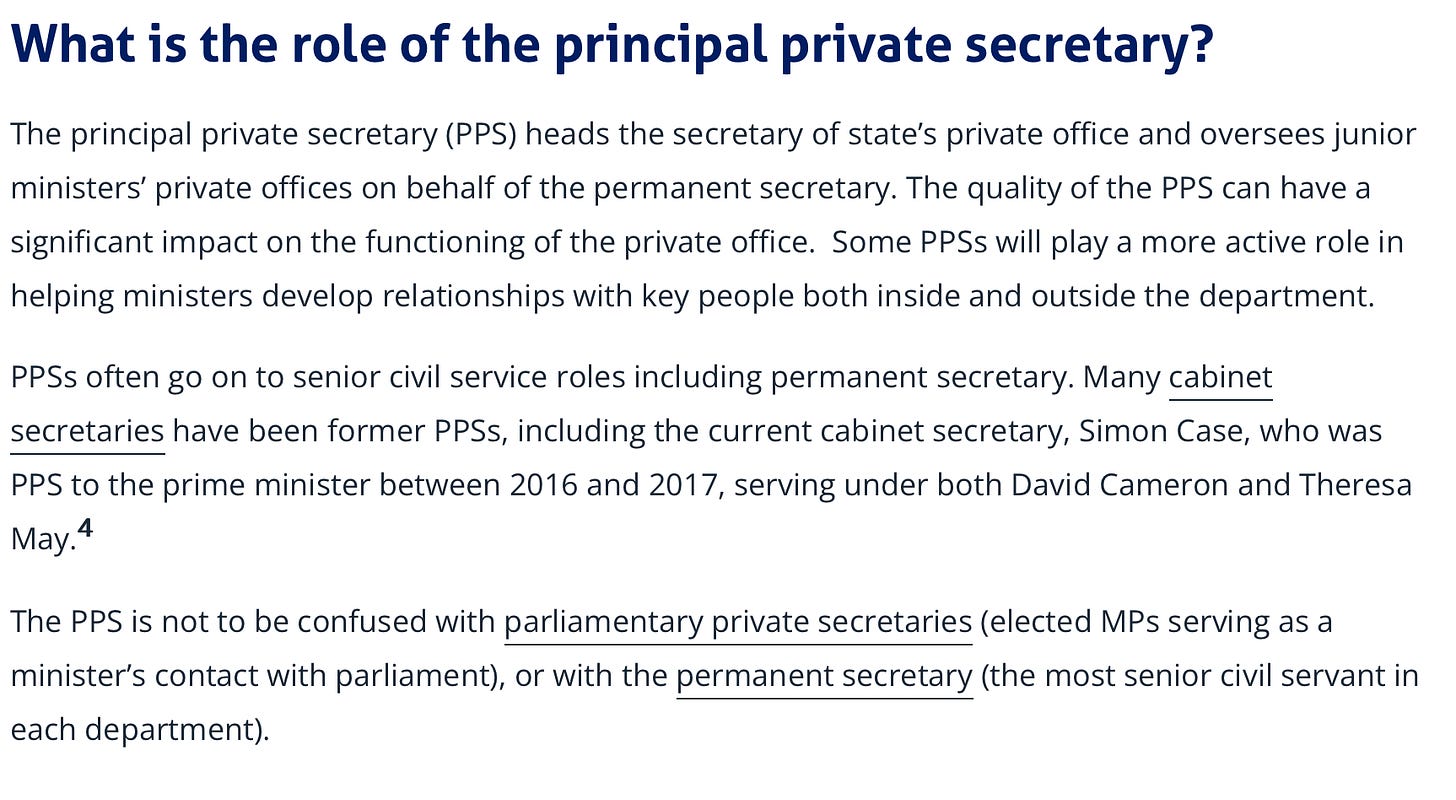Q2a - I am interested in reaching a director role within 5 years, and would love to hear your views and insights on this topic.
UK Civil Service Insights: Reader Questions
The title is taken from the first part of a submission via the anonymous form. Next week, I’ll address the second part in a separate blog.
Firstly, I really hope that you’re able to reach your goal! Secondly, since I’m not a director, I’m not the best person to answer this; however, your submission stated that you’re a current civil servant so that should help you reach out to people that can add to my general thoughts below. Lastly, I’m going to assume that by ‘director’ you mean SCS2.
Image taken from: https://www.instituteforgovernment.org.uk/explainer/grade-structures-civil-service
1. Utilise development tools (e.g. Skills Capture Tool) and map your skills against requirements on Civil Service Jobs
The Civil Service has a large number of professions. Some of these professions e.g. Government Finance Function (GFF), have tools which specify the skills needed at each grade for particular roles. This was the case when I worked in the Project Delivery Profession and also now in GFF. Therefore, a good starting point would be to review the requirements of a director-level role and map them to your current skills gaps. I’m not sure how much experience you’ll need as an SCS1 before moving to an SCS2 role, but you’ll also want to factor that in.
I don’t know what your current grade or previous experience is, but from my limited exposure to SCS recruitment (as a staff engagement panel member), they seem very competitive and all the candidates I’ve spoken to seemed to have substantial prior experience e.g. 5+ years in their current role. Again, since I don’t know your work history, that doesn’t necessarily mean your current plan is unrealistic, but you should be mindful that other candidates may already have the breadth and depth of experience needed for an SCS2 role and it may have taken more than 5 years to acquire.
2. Find a mentor at SCS2 (and request to shadow them)
Firsthand experience will be really important… unfortunately it might be difficult to obtain given that there are few SCS2s and they are very busy. The GFF has a mentoring platform (which includes SCS2s), and that may be the case for other professions too. Therefore, it’s worth starting with a platform, or reaching out to an SCS2 directly. Make sure you make the most of the experience e.g. discussing your map above and getting advice on how best to meet the gaps.
Alongside this, it would also be helpful if you asked to shadow them. Unfortunately, there may be some meetings that you can’t attend if they’re of a sensitive nature. Nevertheless, if you’re able to shadow them then that’ll give you insight into what the role entails. This insight may help inform your decision regarding which development schemes (or opportunities) to apply for.
3. Volunteer to be on a staff board for your department (or director general area)
I’ve specified department or director general (DG) area because volunteering within your current directorate is unlikely to give you the opportunity to see the bigger picture to the same extent as a departmental or DG-view.
In my previous role, I was on the Cabinet Office Staff Board for 12 months. The role involved reading the same papers that the Executive Committee (ExCo) receive for their fortnightly meetings, and hearing from the authors of the papers (usually G6 and SCS1) ahead of their ExCo slot. The experience was useful for lots of reasons:
Awareness of wider activities - in my day job, I was focused on my directorate (i.e. director area). This opportunity allowed me to see what was going on in other directorates and things that affect the department as a whole.
Insight into SCS decision making - ExCo members were all SCS2, SCS3, or SCS4. The was a rota to ensure that each staff board member attended ExCo at least once. Given how senior everyone was, it did feel a bit intimating going along (virtually) to the meetings. However, it was helpful in seeing discussions at that level and what next steps look like for the people that came to present to us prior to their ExCo slot.
Communication skills/briefing - there’s definitely a skill when it comes to creating (and talking about) the papers; it always felt like I learned a lot from the presenters. There was definitely a lot to read so one of the things I noted was how the executive summaries and decisions were put together. As an SCS2, you’ll need to have an awareness of lots of things so I suppose you could use this experience as an opportunity to pretend you’re personally being briefed on all of the topics that arise.
4. Apply for development schemes
The Civil Service has a number of accelerated development schemes so do take the opportunity to apply to whichever is relevant to your current grade. Such schemes will help you broaden your network (another great resource when progressing), as well as supporting you with the skills needed at SCS2 (directly or indirectly depending on the scheme). These schemes are highly competitive so it’s worth reaching out to alumni that can help you with tips. However, there are other development schemes within departments and professions that you may find helpful.
5. Do some private office cover and/or consider doing a private office role
A private office (PO) supports a government minister or senior official in carrying out their duties effectively. I’m not sure about SCS2s, but I think every SCS3 has a PO. Therefore, by extension, you’ll see elements of the relevant SCS2’s portfolio by working in their SCS3’s PO. By covering, you’ll get involved in tasks outside the scope of your day job. The benefits are similar to point 3 except that PO cover is a temporary full-time role so you’re immersed in it vs the infrequent nature of the voluntary role above.
I’ve also heard senior PO roles referred to as ‘accelerator’ roles owing to the wealth of experience you get from doing them. Therefore, if such a role aligns with your career goals and work/life balance (PO seem to work very long hours!), then this could be a great opportunity. The principal private secretary is the most senior role, but there are lots of other roles available at different grades e.g. private secretary, chief of staff etc.
Source: https://www.instituteforgovernment.org.uk/explainer/ministers-private-offices
I’m always interested in answering questions, ask away!
Submit a question/topic for future newsletters → https://forms.office.com/r/brqp18VaCL
Take a moment to browse the available jobs and set up job alerts for your ideal role.
For all Civil Service jobs →https://www.civilservicejobs.service.gov.uk/csr/index.cgi
For finance Civil Service jobs → https://financecareers.civilservice.gov.uk




